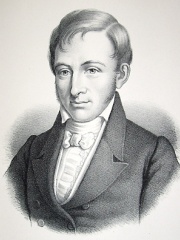
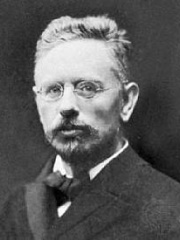

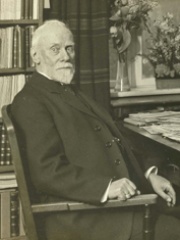

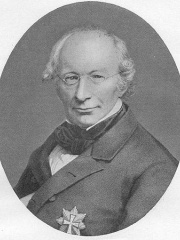
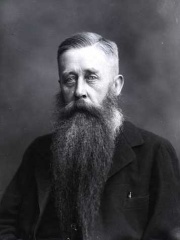
The Most Famous
LINGUISTS from Denmark
Top 8
The following people are considered by Pantheon to be the most legendary Danish Linguists of all time. This list of famous Danish Linguists is sorted by HPI (Historical Popularity Index), a metric that aggregates information on a biography's online popularity.

1. Rasmus Rask (1787 - 1832)
With an HPI of 75.04, Rasmus Rask is the most famous Danish Linguist. His biography has been translated into 44 different languages on wikipedia.
Rasmus Kristian Rask (Danish: [ˈʁɑsmus ˈkʰʁestjæn ˈʁɑsk]; born Rasmus Christian Nielsen Rasch; 22 November 1787 – 14 November 1832) was a Danish linguist and philologist. He wrote several grammars and worked on comparative phonology and morphology. Rask traveled extensively to study languages, first to Iceland, where he wrote the first grammar of Icelandic, and later to Russia, Persia, India, and Ceylon (now Sri Lanka). Shortly before his death, he was hired as professor of Eastern languages at the University of Copenhagen. Rask is especially known for his contributions to comparative linguistics, including an early formulation of what would later be known as Grimm's Law. He was elected as a member to the American Philosophical Society in 1829.

2. Otto Jespersen (1860 - 1943)
With an HPI of 68.47, Otto Jespersen is the 2nd most famous Danish Linguist. His biography has been translated into 48 different languages.
Jens Otto Harry Jespersen (Danish: [ˈʌtsʰo ˈjespɐsn̩]; 16 July 1860 – 30 April 1943) was a Danish linguist who worked in foreign-language pedagogy, historical phonetics, and other areas, but is best known for his description of the grammar of the English language. Steven Mithen describes him as "one of the greatest language scholars of the nineteenth and twentieth centuries."

3. Louis Hjelmslev (1899 - 1965)
With an HPI of 67.38, Louis Hjelmslev is the 3rd most famous Danish Linguist. His biography has been translated into 31 different languages.
Louis Trolle Hjelmslev (Danish: [ˈjelˀmsle̝w]; 3 October 1899 – 30 May 1965) was a Danish linguist whose ideas formed the basis of the Copenhagen School of linguistics. Born into an academic family (his father was the mathematician Johannes Hjelmslev), Hjelmslev studied comparative linguistics in Copenhagen, Prague and Paris (with Antoine Meillet and Joseph Vendryes, among others). In 1931, he founded the Cercle Linguistique de Copenhague. Together with Hans Jørgen Uldall he developed a structuralist theory of language which he called glossematics, which further developed the semiotic theory of Ferdinand de Saussure. Glossematics as a theory of language is characterized by a high degree of formalism. It is interested in describing the formal and semantic characteristics of language in separation from sociology, psychology or neurobiology, and has a high degree of logical rigour. Hjelmslev regarded linguistics – or glossematics – as a formal science. He was a pioneer of formal linguistics. Hjelmslev's theory became widely influential in structural and functional grammar, and in semiotics.

4. Vilhelm Thomsen (1842 - 1927)
With an HPI of 64.26, Vilhelm Thomsen is the 4th most famous Danish Linguist. His biography has been translated into 28 different languages.
Vilhelm Ludwig Peter Thomsen (25 January 1842 – 12 May 1927) was a Danish linguist and Turkologist. He successfully deciphered the Turkic Orkhon inscriptions which were discovered during the expedition of Nikolai Yadrintsev in 1889.

5. Holger Pedersen (1867 - 1953)
With an HPI of 61.51, Holger Pedersen is the 5th most famous Danish Linguist. His biography has been translated into 28 different languages.
Holger Pedersen (Danish: [ˈhʌlˀkɐ ˈpʰe̝(ː)ðɐsn̩]; 7 April 1867 – 25 October 1953) was a Danish linguist who made significant contributions to language science and wrote about thirty authoritative works concerning several languages. He was born in Gelballe, Denmark, and died in Hellerup, next to Copenhagen.

6. Hans Ørberg (1920 - 2010)
With an HPI of 57.99, Hans Ørberg is the 6th most famous Danish Linguist. His biography has been translated into 17 different languages.
Hans Henning Ørberg (21 April 1920 – 17 February 2010) was a Danish linguist and teacher. He received a master's degree in English, French, and Latin at the University of Copenhagen and taught these languages in many Danish high schools until 1963 and then taught in a Danish Gymnasium until 1988. He was the author of LINGVA LATINA PER SE ILLVSTRATA, a widely used method for learning Latin through the natural method.

7. Johan Nicolai Madvig (1804 - 1886)
With an HPI of 56.65, Johan Nicolai Madvig is the 7th most famous Danish Linguist. His biography has been translated into 15 different languages.
Johan Nicolai Madvig (Danish: [joˈhæn ˈne̝koˌlɑjˀ ˈmæðˀvi]; 7 August 1804 – 12 December 1886), was a Danish philologist and Kultus Minister.

8. Johan Ludvig Heiberg (1854 - 1928)
With an HPI of 49.50, Johan Ludvig Heiberg is the 8th most famous Danish Linguist. His biography has been translated into 16 different languages.
Johan Ludvig Heiberg (27 November 1854 – 4 January 1928) was a Danish philologist and historian. He is best known for his discovery of previously unknown texts in the Archimedes Palimpsest, and for his edition of Euclid's Elements that T. L. Heath translated into English. He also published an edition of Ptolemy's Almagest.
People
Pantheon has 8 people classified as Danish linguists born between 1787 and 1920. Of these 8, none of them are still alive today. The most famous deceased Danish linguists include Rasmus Rask, Otto Jespersen, and Louis Hjelmslev.
Deceased Danish Linguists
Go to all RankingsRasmus Rask
1787 - 1832
HPI: 75.04
Otto Jespersen
1860 - 1943
HPI: 68.47
Louis Hjelmslev
1899 - 1965
HPI: 67.38
Vilhelm Thomsen
1842 - 1927
HPI: 64.26
Holger Pedersen
1867 - 1953
HPI: 61.51
Hans Ørberg
1920 - 2010
HPI: 57.99
Johan Nicolai Madvig
1804 - 1886
HPI: 56.65
Johan Ludvig Heiberg
1854 - 1928
HPI: 49.50
Overlapping Lives
Which Linguists were alive at the same time? This visualization shows the lifespans of the 8 most globally memorable Linguists since 1700.

